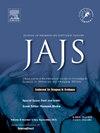肩锁关节压痛会影响肩袖修复的效果吗?一项前瞻性队列研究
Q4 Medicine
引用次数: 0
摘要
目的:本研究的目的是评估退行性肩袖撕裂和肩锁关节(ACJ)压痛患者进行肩袖修复(RCR)而不进行锁骨远端切除(DCE)的功能结果。方法:对70例关节镜下无DCE的RCR患者进行前瞻性评估。记录影像学上是否存在ACJ关节炎和肱二头肌腱长头(LHBT)病理(术中)等参数。术前和术后1年评估ACJ压痛和临床结局评分,包括牛津肩评分和手臂快速失能评分,以及肩手评分。结果:失访4例。在其余66例患者中,50%的研究人群发现ACJ压痛。ACJ压痛与肱二头肌肌腱病变呈显著正相关(R = 0.37, P = 0.002)。术后,有或无ACJ压痛患者的临床结果评分有显著改善。在压痛性ACJ患者中,78.7%的患者压痛完全消失。结论:ACJ压痛对RCR后的结果没有不良影响。此外,有ACJ压痛的患者LHBT肌腱病变的发生率更高。本文章由计算机程序翻译,如有差异,请以英文原文为准。
Does acromioclavicular joint tenderness affect the outcome of rotator cuff repair? A prospective cohort study
Purpose: The purpose of this study was to assess the functional outcome of rotator cuff repair (RCR) without distal clavicle excision (DCE) in patients with degenerative rotator cuff tear and acromio-clavicular joint (ACJ) tenderness. Methods: A cohort of 70 patients undergoing arthroscopic RCR without DCE were prospectively evaluated. Parameters such as the presence of ACJ arthritis on imaging and long head of biceps tendon (LHBT) pathology (intra-operative) were recorded. The ACJ tenderness and clinical outcome scores including Oxford shoulder score and quick-disability of arm, and shoulder and hand score were evaluated preoperatively and at 1-year postoperatively. Results: Four patients were lost to follow up. Of remaining 66 patients, ACJ tenderness was found in 50% of the total study population. ACJ tenderness showed significant positive correlation with biceps tendinopathy (R = 0.37, P = 0.002). Postoperatively, there was significant improvement in clinical outcome scores which were comparable in patients with or without ACJ tenderness. Among patients with tender ACJ, the tenderness resolved completely in 78.7% of patients. Conclusions: ACJ tenderness did not adversely affect the outcome following RCR. Furthermore, the patients with ACJ tenderness have higher incidence of LHBT tendinopathy.
求助全文
通过发布文献求助,成功后即可免费获取论文全文。
去求助
来源期刊

Journal of Arthroscopy and Joint Surgery
Medicine-Orthopedics and Sports Medicine
CiteScore
0.60
自引率
0.00%
发文量
1
期刊介绍:
Journal of Arthroscopy and Joint Surgery (JAJS) is committed to bring forth scientific manuscripts in the form of original research articles, current concept reviews, meta-analyses, case reports and letters to the editor. The focus of the Journal is to present wide-ranging, multi-disciplinary perspectives on the problems of the joints that are amenable with Arthroscopy and Arthroplasty. Though Arthroscopy and Arthroplasty entail surgical procedures, the Journal shall not restrict itself to these purely surgical procedures and will also encompass pharmacological, rehabilitative and physical measures that can prevent or postpone the execution of a surgical procedure. The Journal will also publish scientific research related to tissues other than joints that would ultimately have an effect on the joint function.
 求助内容:
求助内容: 应助结果提醒方式:
应助结果提醒方式:


